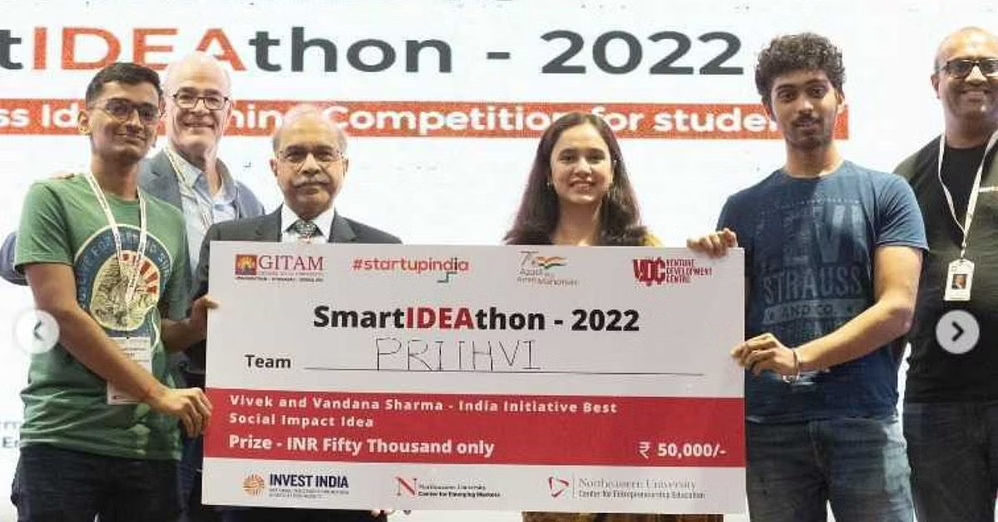
How IIT Guwahati Students Innovates Portable Braille Printer 20 Times Cheaper Than Imported Ones
- Brand of Bharat
- 04 Sep, 2022
- 1755
Around a year ago, Bengaluru-resident and IIT-Guwahati student Kaviraj Prithvi was searching for an idea to help the disabled as part of a college project. On visiting one of the blind schools in his city and during his interactions with the students and teachers of the school, the 20-year-old understood what the institute lacks – a cost-effective mechanism to print texts.
“Even the basic braille printers, which are mostly imported, cost between $2,000 – $3,000 (~Rs 1,50,000 – 2,50,000). The majority of special schools in India run on a tight budget which makes it impossible for them to import printers. After the school visit, I felt an urge to fill this gap and help the students in any possible way,” says Kaviraj, the final year Physics student.
Kaviraj was always fond of innovations. It was during his high school days that he realised this inclination and he nurtured it all the way. Being on an IIT campus motivated him to do more which led to the formation of a company called ‘Prithvi Systems and Innovations’, which he founded with some of his friends.
He says, “Innovation is a part of our curriculum. As multiple projects are to be done before the course completion we thought why not do them under our own company? Also, we focus on the social angle of our innovation. What is the purpose of innovating something which is of no use to any section of the society?”
Kaviraj says that it was a coincidence that he visited a blind school while searching for new ideas of innovation. “While being there, I felt like doing something useful for the students and I started asking them some random questions. Even the teachers were not fully able to articulate their need to have easy access to braille printed texts which would benefit the students a lot. Reaching back to the hostel, I put together everything they said and arrived at a low-budget braille printer idea,” he explains.
Cost-effective printer
Prithvi Innovations’ braille printer will “cost 20 to 30 times less than that of an imported one”, says the founder. “The innovation is in the prototype stage. Once done, it could work efficiently for 8 to 12 months,” he adds.
Named ‘Tactall’, it is a mouse-sized portable printer. It receives data from computer devices, converts that information in braille, and then onto paper through the use of solenoids. Another specialty of Kavin’s invention is that it can print on pages of any size while normal braille printers would only work on A4 size sheets.
“The ideation of this printer happened in January and the prototype was ready by June. We hope to complete the trials by January next year and launch by April,” shares Kaviraj
The youngsters’ invention has already received interest for trials from the same school Kaviraj visited last year and from an NGO in Guwahati . “We are happy that our innovation is going to help hundreds of students all over the country. We consider making their lives easy as our responsibility,” he adds.
The innovation won the Best Social Impact Business Idea at the SmartIDEAthon 2022 – a nationwide pitch fest organised by Startup India in association with several universities in the country. Kaviraj’s team was one among the 1,200 shortlisted groups for the fest.
The young student and his 15-member team claim to be on their way to innovating more of such assistive tech. “It was my dream to set up a company and innovate things which will help people in some way,” he says. “It became a reality so soon, all credits to my team,” he gushes.
The team’s new inventions – a blood pressure monitor and a unique wheelchair – are under construction. Speaking about the inventions, he says, “The monitor is a non-invasive blood pressure monitoring system. The wheelchair, on the other hand, is not a conventional wheelchair but a suspension system designed specifically for wheelchairs. It can be used in other support vehicles as well. A rotor system for helicopters which will allow easier rescue operations by lessening troubles while transporting patients is another one on our list.”
After course completion, Kaviraj hopes to continue with his innovations and run his company more efficiently. “I would employ more young brains and we would collectively work to make the lives of the disabled a bit easier,” he says.
